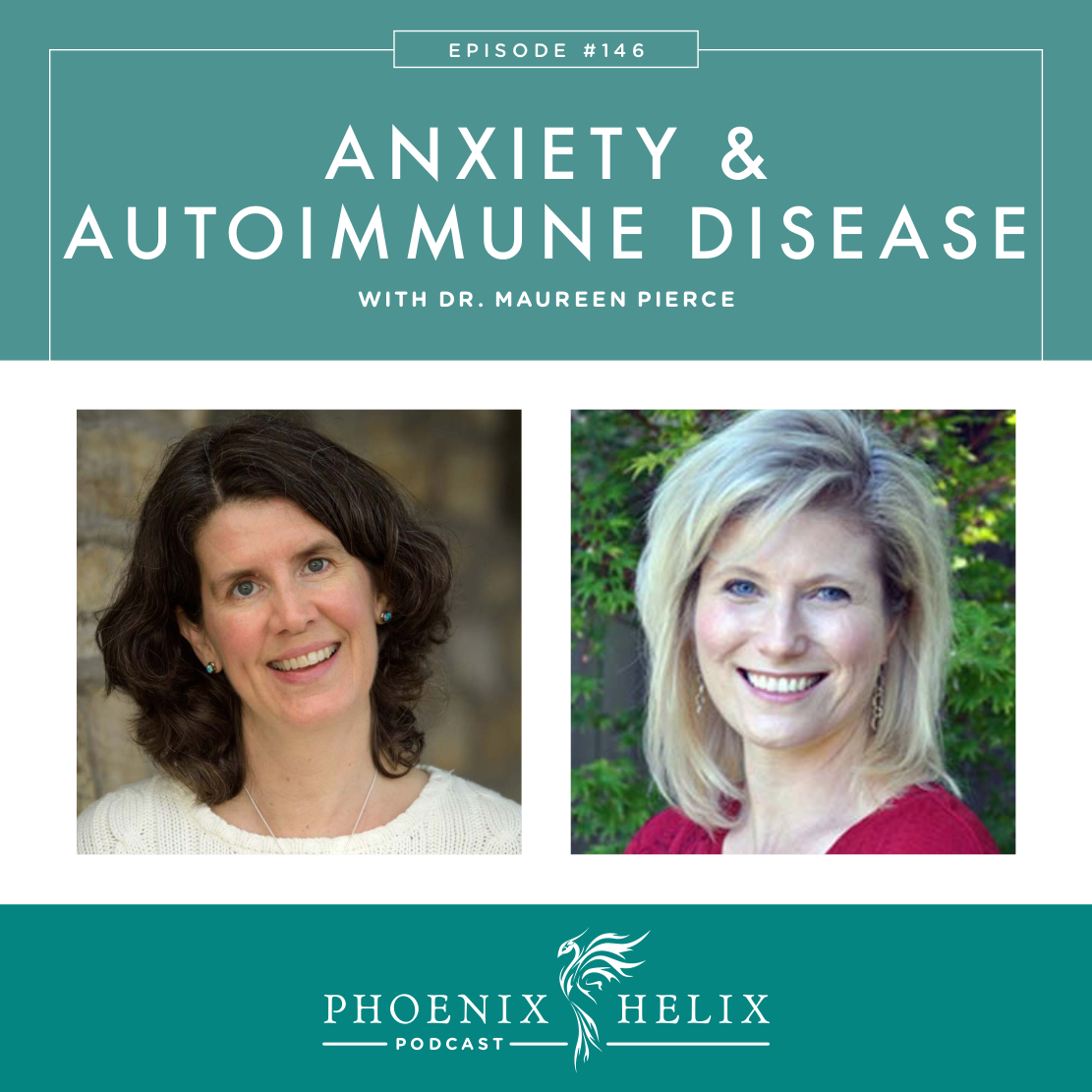Understanding the Connection
People with autoimmune disease have higher rates of mental health challenges overall than the general population. There are many reasons for this. Inflammation doesn’t just occur in the body – it also occurs in the brain. Gut health impacts both autoimmune health and brain health. And of course, having a chronic illness is hard, and it’s natural to feel the strain not just physically, but mentally and emotionally as well. In this episode, we explore the evolutionary role of anxiety, share practical tips to address it in the moment, as well as tools to help reduce and manage anxiety more effectively long-term. My guest is Dr. Maureen Pierce, a health psychologist who specializes in working with people with chronic pain and chronic illness, as well as first responders.
Listen to the Show
- Subscribe to my podcast through your favorite podcast app: iTunes, Stitcher, Google, TuneIn, Spotify, Amazon, etc.
- You can also listen to the episode right here through the player below, and if you subscribe to my newsletter you’ll get notified of future episodes.
Podcast: Play in new window | Download
Show Notes
- Intro (0:00)
- Meet Dr. Maureen Pierce
- Dr. Pierce is a health psychologist who specializes in working with people with chronic pain and chronic illness, as well as first responders. She has a private practice in Des Moines, WA (outside of Seattle), and she has a holistic approach to therapy: helping her patients address all the factors that affect mental, emotional, and physical health.
- To hear my prior interview with Dr. Pierce, listen to Ep. 108: Trauma & Autoimmunity.
- Thank You To Our Podcast Sponsor – Luminance Skincare (2:30)
- The average adult in the United States uses 9 personal care products daily, containing over 100 unique chemical ingredients. What you may not know is that your skin absorbs those chemicals. Some medications are even prescribed as patches, because the skin is such an effective path to the bloodstream.
- That’s why I love Luminance. Whereas conventional skincare products are full of chemicals that can hurt our bodies, Luminance is made from ingredients that nourish. Their products are natural, organic, wildcrafted, non-GMO, and gluten-free.
- They have a complete face and body care line, including cleansers, toners, moisturizers, masks, acne serum, sunscreen, haircare, and more.
- And very timely right now, they have a natural hand sanitizer. It’s 70% pharmaceutical-grade alcohol, meeting the CDC recommendations to be effective against COVID-19, but without the chemical additives and fragrances found in traditional hand sanitizers.
- Place an order here, and use the code HELIX for 10% off your first order.
- Special COVID Note (4:13)
- This podcast is airing during the 2020 coronavirus pandemic. Anxiety & Autoimmune Disease was on my list to cover later this year, and I moved it forward in the schedule since we’re all feeling extra anxiety right now. That said, this is an “evergreen” episode. That means the advice we share today applies to any situation with anxiety, not just during the time of the coronavirus (although it definitely applies now, too). If you’re looking for information specifically about the virus, tune into Ep. 144: Coronavirus & Autoimmune Disease.
- Does Anxiety Have a Purpose? (5:16)
- The evolutionary role of anxiety is survival. It alerts us to a potential threat, and energizes and motivates us to either flee or repel that threat. Originally, the threats came in the form of animal predators.
- In modern life, the “predator” is our alarm clock, the full email box, the never-ending to-do list, traffic jams, coworker conflict, doctor appointments, financial worries, the stress of managing chronic illness, etc.
- Modern anxiety is fear that arises in the absence of danger. It’s like a car alarm that goes off by itself, when no thief is nearby. Anxiety itself becomes the threat instead of the protection it was designed to be.
- Anxiety & Autoimmune Disease (7:49)
- Adverse Childhood Experiences (ACES) increase the risk of developing both autoimmune disease and an anxiety disorder.
- Autoimmune disease itself can cause anxiety through all the pathways we mentioned in the introduction to this podcast.
- In addition, sometimes anxiety masks an undiagnosed autoimmune disorder. For example, anxiety is a common symptom of thyroid disorders (both hypothyroid and hyperthyroid). An important role of the psychologist is identifying when this might be the case and referring the patient to their primary care physician for testing. When the root cause is addressed (the thyroid), the anxiety often improves as a result.
- The Upside of Anxiety (12:52)
- When anxiety is at a mild level, it does have some benefits. It can be energizing and keep us alert, fueling productivity, and making it less likely we’ll miss important details. It can also encourage us to raise our bar when it comes to performance.
- However, when it becomes more severe it causes more harm than good. So, anxiety isn’t something we want to nurture, but it is something we want to befriend.
- When Anxiety Becomes Problematic (15:08)
- As anxiety increases, life gets narrower. People become more focused on protection against risk and avoid new experiences.
- Physical symptoms may include tunnel vision, restricted breathing, muscle tension, an inability to settle down, and a mind that feels like it’s on spin.
- Language also changes, and our bodies are listening. Sometimes the language is about the anxiety: “I’m afraid. I’m uncomfortable. I’m nervous.” Other times, the language is denial of the increasing symptoms: “It’s all good. I’m fine. It will be all right.”
- Symptoms of mild anxiety: Intermittent worry, usually about specific situations. You’re still functional in life, but the anxiety is in the background at a low hum. Many people in modern life experience this.
- Symptoms of moderate anxiety: In addition to worry, you may experience occasional panic attacks. Procrastination is common. Sleep starts to become more challenging. Friends and family may notice your symptoms. And your language about anxiety increases.
- Symptoms of severe anxiety: Panic attacks are frequent. Sleep becomes significantly disturbed (which in turns worsens anxiety, creating a vicious cycle). You’re easily overwhelmed by small tasks or minor changes. You may become agoraphobic, unable to leave your home.
- Techniques for Managing Anxiety in the Moment (20:38)
- The STOP Method: S = Stop / T = Take a breath / O = Observe / P = Plan & Proceed.
- Deep Belly Breathing is the quickest portal to our body’s relaxation response.
- Grounding Skills: Access the five senses to get out of your head and into your body, and immerse yourself in the present moment. Wash your hands under running water. Sniff relaxing essential oils (lavender & chamomile). Suck on a slice of lemon. Grab the arms of a chair with your hands. Stand in mountain pose.
- Once you feel calmer, look for insight: What is this anxiety trying to tell me?
- Frontloading: Look at your upcoming week and identify the points where anxiety is likely to surface. Create a plan to support yourself in those moments. Visualize the positive outcome and the positive feelings you would like to have. This teaches you how to approach instead of avoid the things that make you anxious. It fosters a proactive rather than a reactive mindset.You can also do this on a daily basis – take 5 minutes in the morning to create a positive visualization for your day.
- Positive Mental Triggers: This is a technique by Brendon Burchard that helps reset your nervous system to “calm” multiple times a day.
- Notification Trigger: Set a notification on your phone that appears 3-5 times per day with a positive mantra, such as: Bring the joy. Let there be gratitude. Peace is a choice. May I be grounded in my body.
- Doorframe Trigger: Visualize a positive statement above any doorframe you walk through, such as: I am present and grounded. I enter this space as a calm person.
- Red Light Trigger: Whenever you are stopped at a red light, place your hand on your belly and take 3 deep belly breaths.
- Panic Attacks (29:31)
- Dr. Pierce’s approach to psychology is similar to the functional medicine approach to autoimmune disease. She sees symptoms as messengers, and looks for root causes.
- One of the first things she does is ask someone about their very first panic attack. When and where did it happen? What were the circumstances? How did you cope? What is the origin story? This is a way to start learning to listen to your body. What are the panic attacks trying to tell you? Sometimes, they are a sign that major change is needed – in a relationship, in the workplace, in how you manage your health, etc.
- Because panic attacks are so uncomfortable, many people practice safety behaviors to try to prevent them from happening. This is where life starts to narrow. You avoid potentially triggering circumstances. You depend on outside support: a spouse, a child, a pet, a ritual, an object, or medication. You trick yourself into thinking you’re managing the anxiety, when really, these “safety behaviors” make anxiety worse.
- Be careful with language: say “the anxiety” and “the panic attacks” rather than “my anxiety” and “my panic attacks”. You don’t want to attach your identity to them.
- Some of the symptoms of a panic attack can mimic sensations that show up in other areas of life. For example, exercise causes an increased heart rate and perspiration, too. You may need to learn to disassociate those physical symptoms from the feeling of panic.
- The AWARE Technique originally created by Dr. Aaron Beck is a helpful method for navigating a panic attack:
- A = Acknowledge and Accept that it’s happening. You can’t make a panic attack stop, nor can you flee from it.
- W = Wait and Watch. Pay attention to what’s going on in your body. Understand that discomfort isn’t danger.
- A = Action. Do what you can to make yourself comfortable and ride the panic wave until it dissipates.
- R = Repeat the steps above until the panic attack ends.
- E = End. Every panic attack does end.
- Thank You to Our Podcast Sponsor: Paleo on the Go (40:05)
- A frozen meal delivery service, 100% of their menu is compliant with the elimination phase of the paleo autoimmune protocol (AIP). They have over 6o items, including entrees, side dishes, broth, AIP-friendly bacon, and desserts.
- Use the code PHOENIX for 10% off your first order.
- Diet & Lifestyle Tips to Reduce Anxiety (41:42)
- Reduce of eliminate these from your diet (they increase anxiety and also disrupt sleep): Caffeine, Refined Sugar, and Alcohol.
- Alcohol gives people a false sense of relief due to the immediate relaxation effect, but when it’s detoxified by the liver, it breaks down into a stimulant and spikes anxiety and disrupts sleep. It also interferes with nutrition and hormone balance and can be a root cause of panic attacks.
- Pay attention to gut health. The majority of the body’s seratonin is made in the gut, not the brain. Also, the gut sends more messages to the brain than the brain sends to the gut. (Resource: Ep. 116 – The Gut-Brain Connection).
- Exercise has been well-studied as a beneficial treatment for anxiety. This includes aerobic exercise, but also gentler methods such as yoga and tai chi. (Resource: Ep. 138 – Exercise and Autoimmune Disease.)
- Sleep disturbance is the #1 precursor to any psychiatric disorder. Even a small amount of sleep deprivation changes our brain’s perception – we’re more likely to classify neutral things as negative, which can greatly increase anxiety. (Resource: Ep. 94 – Troubleshooting Sleep.)
- Spending time in nature is also very soothing to the nervous system. In Japan, they call it “forest bathing”.
- Epsom salt baths and float tanks flood the body with magnesium, which is very soothing for anxiety.
- Therapy for Anxiety (47:06)
- Cognitive Behavioral Therapy (CBT) looks at how our thoughts impact feelings and behavior. Faulty thought patterns can trigger anxiety, and by transforming those, anxiety diminishes.
- Eye Movement Desensitization and Reprocessing (EMDR) addresses root causes of anxiety and helps to shift the body into a calmer state of being.
- Dr. Pierce discusses both of these therapies in more detail in podcast episode 108.
- Anxiety Medication (49:42)
- Dr. Pierce doesn’t recommend medication without complementary therapy. Medication alone bypasses the root causes of anxiety and isn’t as effective long-term.
- When it comes to medication decisions, each patient is individual. For most patients, Dr. Pierce prefers to start with therapy and anxiety management skills, only adding medication if necessary. If medication is needed, it’s usually short-term, and patients taper off medication once the skills are established and the root causes of anxiety have been addressed. That said, there are some patients who may benefit from medication long-term.
- Dr. Pierce recommends medication if panic attacks are greatly interfering with someone’s life (they can’t drive, or go out in public). She also considers medication if someone is unable to sleep.
- Benzodiazepines are addictive and best when prescribed only a short period of time.
- Non-addictive medications that can be helpful for anxiety are propranolol (an anti-hypertensive) and hydroxyzine (an anti-histamine).
- GeneSight is a website that analyzes your genetic profile to see how your body may respond to psychotropic medications.
- Nutrients to Reduce Anxiety (53:12)
- Magnesium is called “the relaxation mineral” and most people are deficient. It’s hard to get enough through diet alone, and both stress and caffeine deplete it. Dr. Pierce recommends supplementing with magnesium glycinate or through Epsom salt baths.
- Low levels of omega-3 fatty acids are also associated with anxiety. Fish are the best dietary source, and you can also supplement with a high-quality fish oil.
- Low levels of B vitamins can also cause anxiety. There’s a gene mutation called MTHFR that interferes with the processing of B vitamins by the body, especially folate. Anxiety and panic attacks are common symptoms of this mutation. For more information, listen to Ep. 137 – MTHFR with Dr. Ben Lynch.
- How To Find a Good Therapist (55:54)
- Word-of-mouth referrals from someone facing a similar issue is ideal.
- Check your state psychological association for a list of licensed therapists. If you have insurance, check your insurance company’s website for a list of approved providers.
- CBT Therapist Directory.
- EMDR Therapist Directory.
- Research therapists through their website first. Then, during the first phone call ask clarifying questions about their training, experience, approach, and main treatment interests. Are they warm and receptive?
- How do you feel after the first appointment? Trust your gut. Sometimes you find the right therapist right away. Other times, it takes a few tries to find a therapist that is a good fit.
- Final Words of Wisdom (58:51)
- Anxiety is part of the human experience. It’s not something we can eliminate completely, nor should we. The goal is to make anxiety our friend.
- Don’t judge yourself for having anxiety, and if you suffer from severe anxiety it’s not your fault or a flaw in your character. We each have health vulnerabilities – both physically and mentally. There are many potential root causes to anxiety. But there are also many pathways for help.
- Outro (59:42)
- Dr. Maureen Pierce has a private practice in Des Moines, WA (outside of Seattle) and is accepting new patients. Her primary website is DrMaureenPierce.com. If you or someone you love is a first responder, she offers special services through First Responder Psychological Services. Listen to my prior interview with Dr. Pierce: Ep. 108 – Trauma & Autoimmunity.
- Eileen (your podcast host) is the author of multiple books, written to help people thrive with autoimmune disease. Learn more on the Books Page.
- If you like this podcast, follow or subscribe through your favorite podcast app. You can also subscribe to Eileen’s biweekly newsletter.
- Check out the entire archive of podcast episodes.
You May Also Be Interested In
Spreading the Word
If you like the podcast, please leave a positive review in iTunes. It would mean the world to me, and also helps others find the podcast. Here are some quick instructions using your iPhone:
- If you are already subscribed to my podcast: (1) Click the purple podcast icon. (2) At the bottom of the screen, click Library. (3) At the top of the screen, click Shows. (4) Click the Phoenix Helix podcast image. (5) Scroll down the page, and you’ll see Ratings and Reviews. Scroll down a little bit more and click on Write a Review. This will bring up the review screen. Tap 5 stars (if you love the podcast), and then click in the title box, and it will bring up the keyboard. Enter a title and short review. (6) Click Send in the upper right corner. (7) Thank you! Positive reviews give the podcast a higher search ranking in iTunes, helping people find it and letting them know it’s a quality podcast and worth their time to listen.
- If you haven’t subscribed to my podcast: (1) Click the purple podcast icon. (2) In the lower right corner, click the magnifying class. (3) Type Phoenix Helix in the search box. (4) Click the podcast cover in the Show list. (5) If you’d like to subscribe, click the + sign at the top of the screen. (6) To write a review, scroll down the page, and you’ll see Ratings and Reviews. Scroll down a little bit more and click on Write a Review. This will bring up the review screen. Tap 5 stars (if you love the podcast), and then click in the title box, and it will bring up the keyboard. Enter a title and short review. (7) Click Send in the upper right corner. (8) Thank you! Positive reviews give the podcast a higher search ranking in iTunes, helping people find it and letting them know it’s a quality podcast and worth their time to listen.









I see this in my 74-year-old husband with cognitive decline. He is considered an “essential worker.” With the many changes that are taking place DAILY in his work place, it is overwhelming and exhausting to his poor brain.His management may com in at 8 a.m. and say,”Today we are doing this…” and then they come back at noon and say” Now we must be doing this.” He comes home fro work now with a totally “fried” brain from thinking, adapting and focusing because his poor brain can’t keep making so many changes at a such fast pace.
This is such a wise insight, Donna. It’s overwhelming for all of us, but it must be especially challenging for him. Wishing him good sleep every night, and supportive coworkers as they do very difficult work together. How are you doing? I can see where this would be an anxious time for you as well.